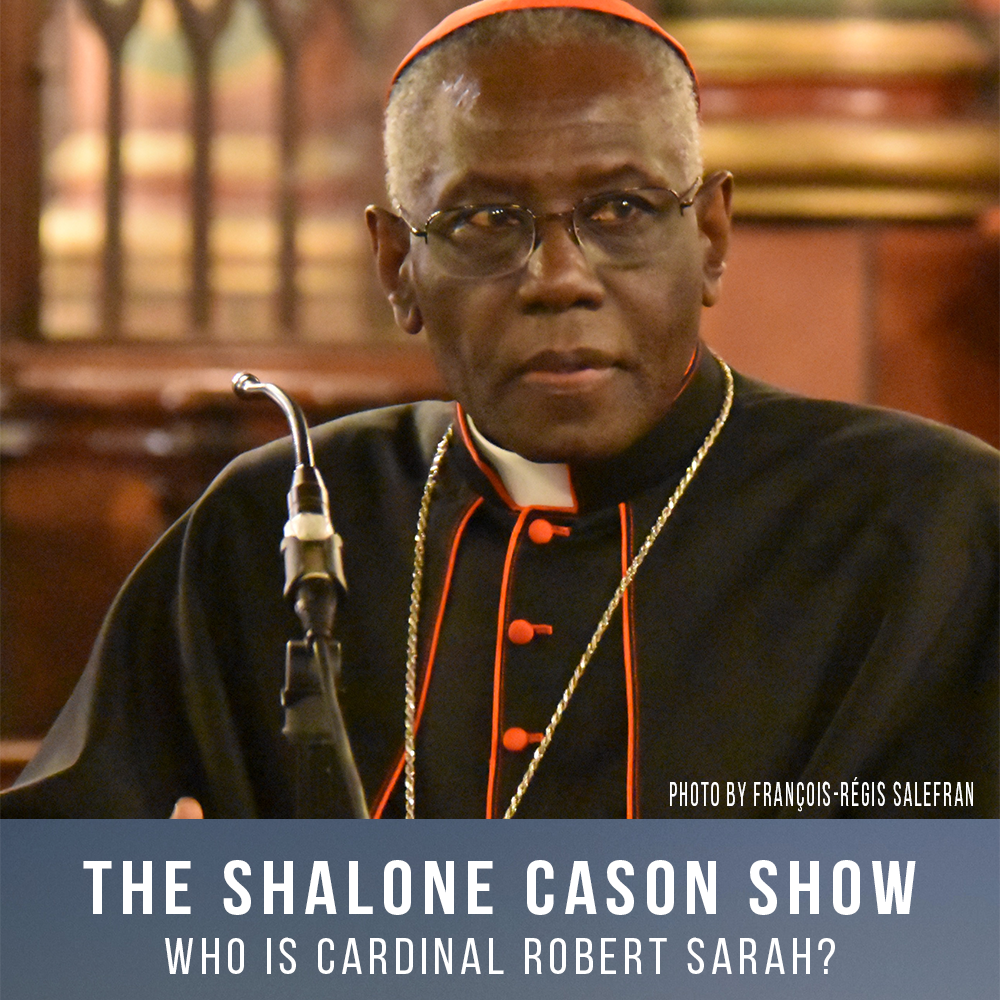Please Subscribe or Donate to Help Keep This Site Free!
Full Script
Robert Sarah (born 15 June 1945) is a Guinean prelate of the Catholic Church. A cardinal since 20 November 2010, he has been appointed to many prestigious positions throughout his career such as, bishop of Conakry in Guinea, president of the West African bishops conference, and leader of Congregation for Divine Worship.
He is a prominent voice of the College of Cardinals and in the Roman Curia, and a forceful advocate for the defense of traditional Catholic teaching on questions of sexual morality and the right to life, and in denouncing Islamic radicalism. He has been a possible candidate for the papacy since 2013.
Today, we are discussing the life of Cardinal Robert Sarah:
Welcome to Mental Prayer with Shalone Cason. Don’t forget to leave a review on Apple podcasts. Everywhere else, please like, share, and subscribe. You can also support the podcast for as little as $1 a month. And if you have questions or comments, I would love it if you leave me a voicemail. All links are in the description. Now, let’s begin, as always: in the name of the Father, and of the Son, and of the Holy Spirit. Amen.
So with mental prayer, there are many ways to go about it.
I prefer reading a short passage multiple times while focusing on different questions, such as what the passage means, how it makes you feel, and how you can live better. Initially, we’re going to simply discuss the life of Cardinal Robert Sarah. Next, we are going to use one of his quotes to practice mental prayer.
First, if you don’t know what a cardinal is, here is a quick definition:
A cardinal is a bishop of the Catholic Church with special authority from the pope. Cardinals were from a very early period, assistants of the pope in his liturgical functions, in the care of the poor, the administration of papal finances and possessions, and the synodal disposition of important matters. Cardinals are especially important because they select the next pope from their ranks after a pope dies. You can check out the episode on cardinals at sdcason.com/reference.
Sarah was born in Ourous, a rural village in then French Guinea, on 15 June 1945,
the son of converts to Christianity from animism. In 1957, at age 12, he entered Saint Augustine Minor Seminary in Bingerville, Ivory Coast, where he studied for three years. He continued his studies briefly in Conakry, Guinea, at Saint Mary of Dixinn Seminary run by the Holy Ghost Fathers, until the radical government of Guinea took over church property in August 1961. After independent study at home, he was sent to study at the Grand Seminary in Nancy, France in 1964. Again deteriorating international relations, this time between Guinea and France, forced him to interrupt his studies, and he completed his theological studies in Senegal, between October 1967 and June 1969. From 1969 to 1974 he studied at the Pontifical Gregorian University in Rome, where he obtained a licentiate in theology, except for the year 1971 which he spent at the Studium Biblicum Franciscanum of Jerusalem, where he obtained a licentiate in Sacred Scriptures. Sarah speaks French, English and Italian fluently.
Sarah was ordained to the priesthood on 20 July 1969.
On 13 August 1979, Pope John Paul II appointed him Metropolitan Archbishop of Conakry. He was consecrated bishop on 8 December 1979. He served as Conakry's bishop for more than twenty years and during that tenure filled terms as president of the Guinean bishops' conference and of the Episcopal Conference of West Africa.
Sarah served as archbishop under the dictatorship of Ahmed Sékou Touré,
who put Sarah on a death-list before he died in 1984. However, despite the persecutions of priests and laymen, Sarah worked to maintain the Church as the one institution that was independent of the dictatorship. In his book God or Nothing, Sarah rebuked the Marxist dictatorship as a utopian scheme that brought misery and death.[7]
On 1 October 2001, John Paul II named him secretary of the Congregation for the Evangelization of Peoples, a post he held for ten years. He used the occasion of his departure from Guinea, when he was awarded the country's highest honor, to condemn the government of Lansana Conté. He said that Guinean society was "built on the oppression of the insignificant by the powerful, on contempt for the poor and the weak, on the cleverness of poor stewards of the public good, on the bribery and corruption of the administration and the institutions of the republic".
On 20 November 2010, Pope Benedict XVI made him Cardinal-Deacon of San Giovanni Bosco in via Tuscolana. He has the right to vote in papal conclaves until his 80th birthday. He was a cardinal elector in the 2013 papal conclave that elected Pope Francis.
He was mentioned in the press as a possible candidate for the papacy, papabile, both in 2013 and in future conclaves.
In October 2010 he was appointed president of the Pontifical Council Cor Unum, which carries responsibility for organising Catholic relief efforts worldwide. He was the second African appointed by Pope Benedict XVI to lead a Vatican dicastery. The first was Peter Cardinal Turkson of Ghana who was appointed president of the Pontifical Council for Justice and Peace in 2009.[16]
On 23 November 2014, Pope Francis appointed Sarah as Prefect of the Congregation for Divine Worship and the Discipline of the Sacraments.
Speaking at a London conference on 5 July 2016, Cardinal Sarah encouraged all bishops and priests to begin celebrating the Mass ad orientem "wherever possible" And he encouraged all Roman rite Catholics to receive Communion kneeling.
Cardinal Sarah has written 4 books:
- From the Depths of Our Hearts: Priesthood, Celibacy and the Crisis of the Catholic Church.
- The Day is Now Far Spent
- The Power of Silence: Against the Dictatorship of Noise
- God or Nothing: A Conversation on Faith: this is basically Cardinal Sarah’s autobiography, so if you want to know more about him, definitely read this book God or Nothing.
Now let’s practice mental prayer using a quote from one of his books.
First, I’m going to read this quote and I want you to think about how it makes you feel.
“Christ lived for thirty years in silence. Then, during his public life, he withdrew to the desert to listen to and speak with his Father. The world vitally needs those who go off into the desert. Because God speaks in silence.”
― Robert Sarah, The Power of Silence: Against the Dictatorship of Noise
Now, I’m going to read the quote again, and I want you to continue thinking about how this quote makes you feel.
“Christ lived for thirty years in silence. Then, during his public life, he withdrew to the desert to listen to and speak with his Father. The world vitally needs those who go off into the desert. Because God speaks in silence.”
― Robert Sarah, The Power of Silence: Against the Dictatorship of Noise
Let’s read the quote again and this time think about what the words mean.
“Christ lived for thirty years in silence. Then, during his public life, he withdrew to the desert to listen to and speak with his Father. The world vitally needs those who go off into the desert. Because God speaks in silence.”
― Robert Sarah, The Power of Silence: Against the Dictatorship of Noise
Once again, I’m going to read the quote and I want you to continue thinking about what the words mean.
“Christ lived for thirty years in silence. Then, during his public life, he withdrew to the desert to listen to and speak with his Father. The world vitally needs those who go off into the desert. Because God speaks in silence.”
― Robert Sarah, The Power of Silence: Against the Dictatorship of Noise
With this next reading, I want you to think about how you can live holier based on the quote:
“Christ lived for thirty years in silence. Then, during his public life, he withdrew to the desert to listen to and speak with his Father. The world vitally needs those who go off into the desert. Because God speaks in silence.”
― Robert Sarah, The Power of Silence: Against the Dictatorship of Noise
So, what can we learn from Cardinal Sarah and what can we learn from his quote?
Well, let’s look at the moral virtues. There are four of them. They are prudence: always moving toward virtue and away from vice. Justice: giving others what they deserve. Fortitude: staying faithful during difficulties. And Temperance: keeping balance in all areas of life. Cardinal Sarah practiced Fortitude. He practiced fortitude during political upheaval in Guinea by not capitulating to the government and by speaking out against Marxism and violent government repressions. So how can we live holier based on his quote? Of course, you should read his book The Power of Silence. It is a thick book all about using silence to become holier. But here is a quote from the book that might help you live holier “It is necessary to protect precious silence from all parasitical noise. The noise of our “ego”, which never stops claiming its rights, plunging us into an excessive preoccupation with ourselves. The noise of our memory, which draws us toward the past, that of our recollections or of our sins. The noise of temptations or of acedia, the spirit of gluttony, lust, avarice, anger, sadness, vanity, pride—in short: everything that makes up the spiritual combat that man must wage every day. In order to silence these parasitical noises, in order to consume everything in the sweet flame of the Holy Spirit, silence is the supreme antidote.” Basically, it is easiest to spend time with God when we are silent. It is the practice of Justice to take moments of silence to contemplate God. So pray silently more often. Don’t think a whole bunch on things you want to ask God for, or that you’re thankful for. Just be still and think about God. That’s it. It’s that simple.
This has been Mental Prayer with Shalone Cason. Don’t forget to leave a review on Apple podcasts. Everywhere else, please like, share, and subscribe. You can also support the podcast for as little as $1 a month. And if you have questions or comments, I would love it if you leave me a voicemail. All links are in the description. Until next time, stay holy my friends and we are going to close out as always: in the name of the Father and of the Son and of the Holy Spirit. Amen. Peace out.

